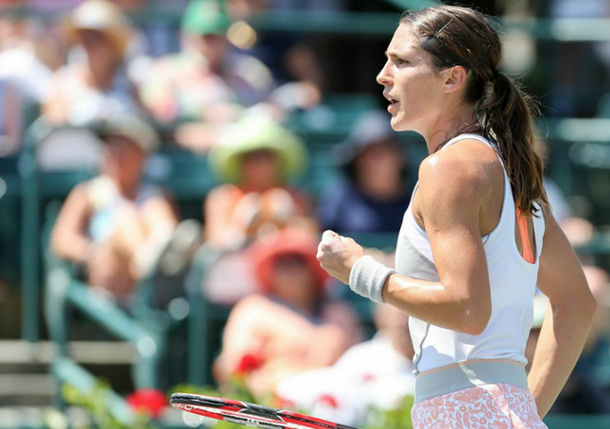
Pro tennis players search for any little edge they can bring to a tennis court—the margins are that small on the pro tours. Sometimes a little hardship can create an opportunity for self-reflection. And that self-reflection can bring about the training that elicits an uptick in form.
More: Petkovic Rebounds to Down Compatriot Witthoeft at Stanford
Elite players have the courage and wherewithal to think critically about their own games and use these lightbulb moments for inspiration. Andrea Petkovic had one of these moments this summer after struggling through a disappointing spring that saw her bogged down by injuries and mental fatigue.
During Post-Wimbledon Break, Petkovic says she underwent one of the more strenuous training blocks that she’s ever endured. “I think probably for the last three years I haven’t worked that hard. I’m still a little tired because up until this tournament (Bank of the West Classic at Stanford) we went at it pretty hard. It was really difficult for me in the clay season when I had food poisoning and I injured my thigh. I just didn’t seem to get [my feet] on the ground again.”
After struggling with fitness at Roland Garros and Wimbledon, Petkovic said she made the decision to eschew tournament competition to get her body back into top shape for the summer grind.
“Normally I always play Bad Gastein, but I decided not to play there so I could get in great shape again,” she said.
She also said that the experience of playing hurt bled into her mental game. Her injuries weren’t enough to take her off tour, but they did cause her to become frustrated, and her concentration suffered.
“It was so frustrating. It was so annoying,” she said, after her first-round victory over Carina Witthoeft at Stanford. “It felt like somebody was constantly stabbing me. It didn’t really hurt but it was annoying—I was like ‘get off my back, already.’ I didn’t really [have a debilitating injury], but I could never really put the work in on court and we all know that I need that to be able to feel great and to play well. I need to move well, I need to rely on my physical stability and my legs. I just wasn’t there.”
Frustrated not only by her injuries, but also by her reaction to them, Petkovic said the experience led her to revisit visualization techniques that had benefitted her concentration in the past.
“I was just sort of relying on my experience and my play but I never felt like I was on top of my game and so I’m really looking forward to the second part of the season,” she said. “When I look back at it, the matches that I won were always really easy matches—like 2 and 3, 3 and 3. The minute it got close and the minute the match got tight I felt like I was faltering in those situations. I took my time and for every day worked for at least a half an hour on visualizations, meditation, concentration work—different stuff, I tried a lot of things and I felt like it has helped me tremendously, so I think I used the break really well after Wimbledon.”
It’s not the first time Petkovic has experimented with these training techniques. “I had been doing stuff before,” she said. “I was always a very mentally tough player, I loved the difficult situations. I was never too worried about that. But now when I couldn’t rely on my physical fitness and rely on my body 100 percent I felt like this [mental] strength was also getting away from me and so I had to put a little extra effort into it… I felt like emotions were getting away and so I had to work a little harder on it.”